Review for See You Tomorrow, Everyone
Introduction
That a new release is due from Third Window Films already has me enthused. That it’s from Yoshihiro Nakamura, who directed Fish Story, and The Foreign Duck, The Native Duck and God in a Coin Locker increases my eagerness no bounds, despite the deceptively mundane PR blurb about life on a housing estate. But when I started watching the film, I had no idea that it would have so much resonance to me.
The year before I was born, my dad got a job teaching at a school on a brand new council estate. Back then, it was the latest and greatest concept in communal living, large, spacious and well equipped apartments, the pedestrian prioritised over the car, central heating for everyone, and all that you would ever need, from shops, post offices, amenities, and services, and plenty of greenery and open spaces within the bounds of the estate. It attracted the upper-middle classes like no tomorrow, and my dad began by teaching the best and the brightest. The odd day when I was little that he’d take me into work with him would be a grand adventure. But, like every other council, they thought once they had built it, they needn’t bother with it anymore, and within the space of ten years, the edges of the concrete masterpiece were beginning to crumble, and those who were originally so eager to move there, became eager to leave.
Fortunately by that time for the occupancy of the estate, the world was becoming a more dangerous place, and the first of several waves of refugees and immigrants was placed in the vacant housing. From Vietnamese boat people, to Somali refugees, Afghans, Ethiopians and Iraqis, it became a convenient dumping ground. Then the eighties happened, Thatcherism, social deprivation, the occasional riot, the absence of money, and further neglect from the council. The shops began to close and the verdant green spaces became a decayed brown. By the time my dad retired from his job twenty years ago, the future of urban communities had become little more than a glorified slum, and it stayed that way until the Ferrier Estate was demolished last year. I had no idea when I started watching See You Tomorrow, Everyone, that I’d see that same story told, but of another council estate, on the other side of the world.
The life of this particular estate is seen through the eyes of the film’s protagonist, Satoru. Satoru from an early age has decided never to leave the estate, believes that all that he could ever need will be found in its confines. He’s supported in this by his mother, who has raised him in a single parent family, but it does mean that his education effectively ends at age 12. While there is an elementary school on the estate, junior high is outside, and Satoru refuses to step beyond the bounds of his home. You’d think that would be a crippling handicap to Satoru, but he has a plan, which involves home schooling, learning karate, and getting a job at age 16 at the estate’s cake shop. The education is for his career, the self defence is so that he can protect the estate and his friends from elementary school who live there. But as the years pass, the friends that he grew up with leave the estate, and with neglect, the place changes beyond recognition. Can Satoru truly live his entire life without leaving the estate?
Picture
See You Tomorrow, Everyone gets a 1.85:1 anamorphic transfer, encoded in NTSC progressive format. The image is generally clear, with consistent colours. It is a tad soft, and on occasion fine detail is prone to shimmer, but generally it’s a very acceptable image with no significant flaws.
Sound
The Japanese audio is in DD 5.1 format, which gives the film space, but isn’t particularly challenged by the dialogue focused piece. There is some subtle sound design at work at places in the story though, where the surround audio is appreciated. The optional English subtitles are accurately timed, but do suffer from the odd typo, especially early on, with ‘gauging’ used instead of ‘gouging’, and ‘delicius’ instead of ‘delicious’. One oddity is that in the trailer, the term council estate is used, but in the film, they use the word ‘projects’ instead, leading me to guess that despite its UK release, this film is really targeted at the US market.
Extras
The disc presents its content with an animated menu. The largest extra is the interview with the director Yoshihiro Nakamura, which last 9 minutes. It’s well worth listening to, an interesting conversation with a fair bit about how he works and his influences, as well as this film in particular.
The See You Tomorrow, Everyone trailer is here, and lasts 2 minutes.
There are also trailers for 18 other Third Window titles.
Incidentally, ahead of the film is a 45-second introduction to the film from the director, although the sound is slightly out of sync for the introduction.
Conclusion
While I was fascinated by the 20-year life story of a Japanese council estate, and how closely it matched my experience, I quickly became lost in Satoru’s story, and the character exploration in this film really grabbed my attention. I love it when you completely lose track of time, and become engrossed in a film, and that definitely happened to me with See You Tomorrow, Everyone. It’s a somewhat deceptive film too, starting off as a light bit of quirky comedy, but then transforming into a quite dark and emotive drama.
After all, the idea of someone refusing to leave a council estate is a little absurd, but it also becomes something of a social experiment. Can Satoru actually live his life without ever leaving the ‘safety’ of his local environment? Of course today it would be wholly possible, the world is connected digitally, and mail order shopping is likely to outstrip the real thing if it hasn’t already done so. He’s actually a NEET before the NEET phenomenon was categorised (this film is set in the eighties and nineties), and like every hikikomori he has his obsessions. Today, in a story like Welcome to the N.H.K., it would be anime, dating sims, and the Internet, but in this pre-Internet age, Satoru has his mind set on working at the local cake shop, learning karate, and protecting the estate. To that end, he even patrols the apartments, noting who’s at home and who isn’t and in that way also marking just how many of his friends and fellow elementary school graduates leave as the years pass.
Such obsessive behaviour is easy to take the wrong way, and it isn’t long before he’s classed as the weirdo on the estate. But he still manages to connect to people, hold onto his friends, and even get his dream job. But with his odd behaviour, and the look at the other people who live on the estate, the first half of the film plays as something of a quirky comedy, and I was strongly reminded of a Sean Lock sitcom called 15 Storeys High, set in a council tower block, that captured vignettes of its oddball residents.
But there has to be a reason why Satoru is so reluctant to leave the estate, and when that is revealed, the depth of his psychological issues explained, the film takes a turn for the dramatic and more tragic. For despite his attempts to live out his life on the estate, the assurances of his mother that he can indeed do so, there’s no stopping the passage of time, and there’s no halting the tide of change. People age, people leave the estate and the friends that he grew up with also leave. With neglect, the estate begins to fall into disrepair and criminality increases. There comes a point where the estate that he wants to protect so badly ceases to exist. At the midpoint of the film, the trauma behind Satoru’s inability to leave the estate is revealed, and it gradually becomes clear that only a similar trauma will be able to free him. When that moment comes, it is heartbreaking, but it’s also uplifting as well.
See You Tomorrow, Everyone is as quirky as you would expect from a Third Window Films release, it’s delightfully funny, but it’s also moving and engaging as well. It is a little like Welcome to the N.H.K., albeit set in a pre-Internet age, and before the otaku phenomenon. As such it should appeal to a much broader audience.
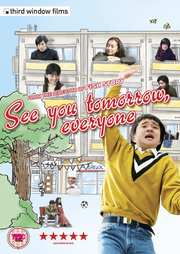































































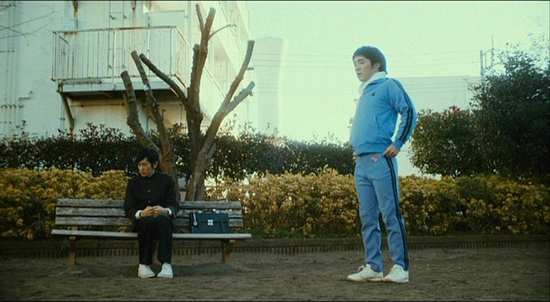
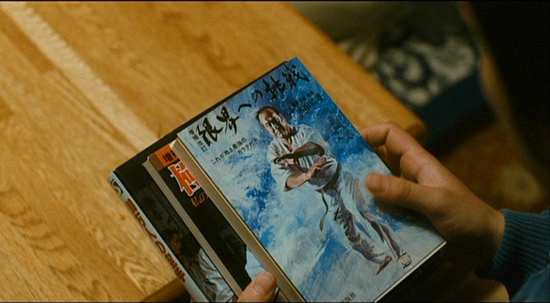
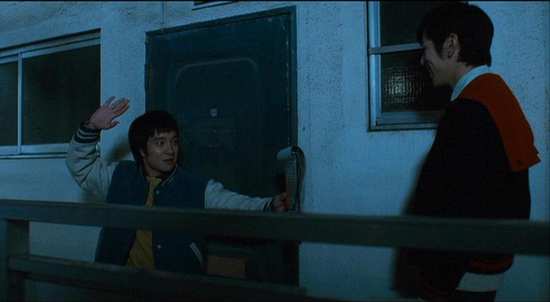
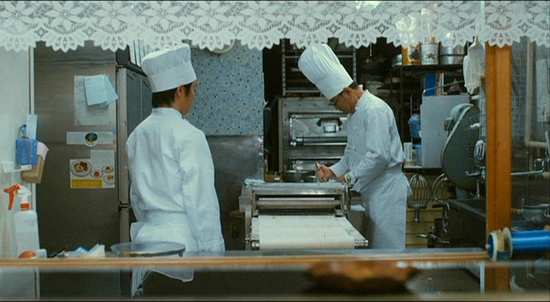
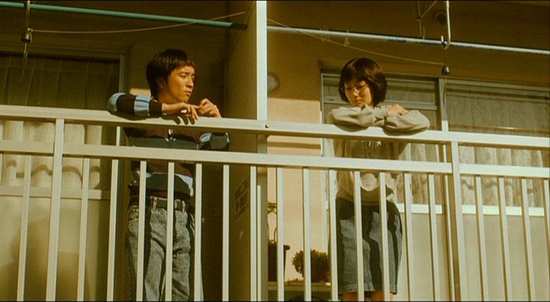
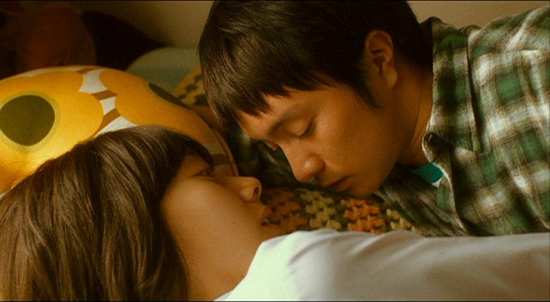
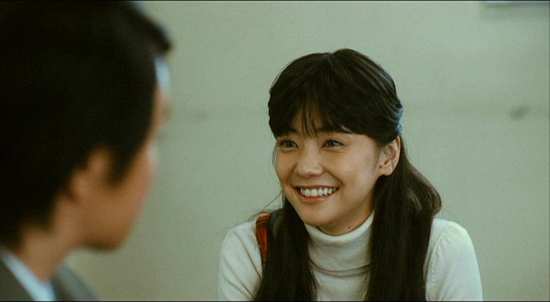
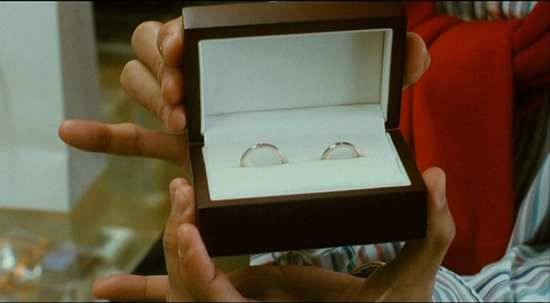
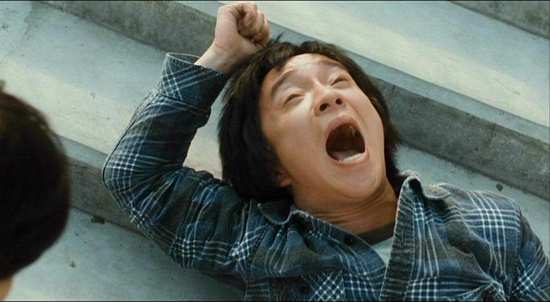
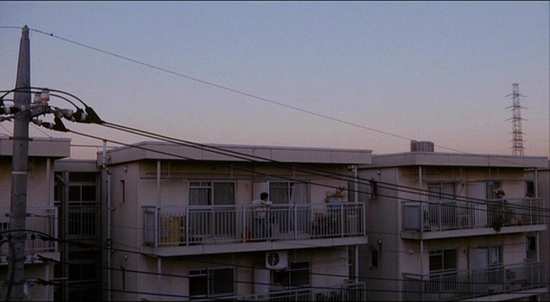
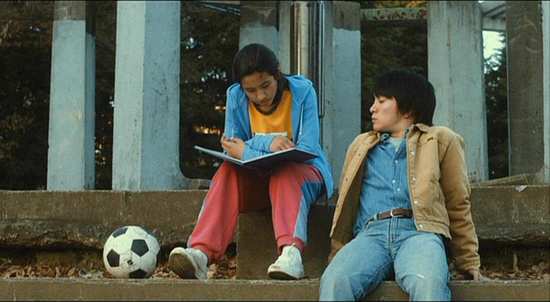
Your Opinions and Comments
Be the first to post a comment!